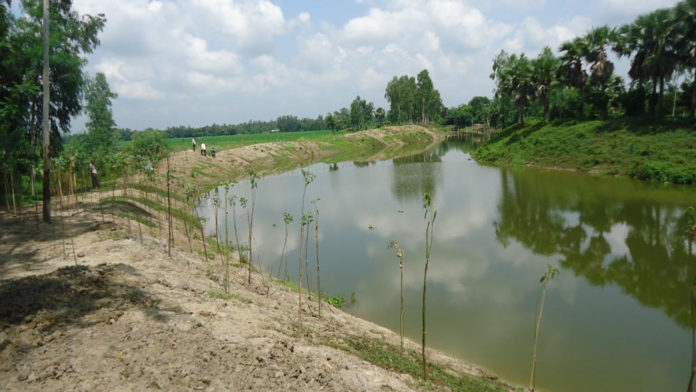RAJSHAHI, Aug 1, 2018 (BSS)-Massive need-based schemes are being implemented in the region including its vast Barind tract aiming at improving its environment through resisting pollution.
According to officials concerned, success has become visible in the field of lessening pressure on underground water to some extent in the drought-prone Barind area.
Emphasis was given to rainwater conservation along with promoting less-water consuming crops contributing a lot towards saving 20 percent ground water.
Underground water level has been declining alarmingly due to groundwater-based irrigation system during the last two and a half decades in the high Barind tract.
Prof Chowdhury Sarwar Jahan of Department of Geology and Mining in Rajshahi University revealed the information referring to a recent survey.
He suggested lessening extraction of groundwater for irrigation purposes.
Derelict ponds and canals need to be excavated side by side with rainwater harvesting and conservation.
Prof Sarwar Jahan said DASCOH Foundation has been implementing a project titled “Integrated Water Resource Management” to mitigate the existing water crises in the drought-prone area through diversified interventions.
SM Mustafizur Rahman, additional director of Department of Agriculture Extension, said the farmers are being inspired and motivated to cultivate less-water consuming crops to keep the groundwater level intact.
“We have already re-excavated 3,032 ponds and 1,643-kilometer canals besides construction of 696 cross-dams for water conservation,” said Engineer Abdur Rashid, executive director of Barind Multipurpose Development Authority
(BMDA).
Rainwater harvesting and conservation has been arranged after excavating 226 dug-wells.
Solar panel was set up in 125 of the wells aiming to boosting production of less-water consuming crops through promoting the eco-friendly irrigation system.
Pontoon has been commissioned in seven places of Padma and Mohananda rivers for water conservation in canals and ponds after lifting river water through pipeline far from three to nine kilometers.
In this way, irrigation is being provided to croplands in double-lifting method through 232 low lift pumps.
Irrigation activities are being conducted through around 8,505-kilometer sub-surface pipeline aims at ending misuse of both agricultural lands and irrigation water.
Engineer Rashid says renewable energy is being used in irrigation purposes through lifting water from canal and ponds.
Solar panels were installed in 106 irrigation machines at different areas providing irrigation to over 4,000 hectares of land through generating two megawatts eco-friendly solar power.
Around 2.56 crore saplings of various fruit, timber and herbal trees were planted in the command area to protect environment and meet the growing demands for fruits and timber in the region.
Tree plantation activities are progressing successfully that will ultimately help reduce carbon emission at a substantial level and that is very important to face the adverse impact of climate change in the vast
Barind tract.
Department of Environment (DoE) has been working here to mitigate air-pollution by brick kilns and factory waste disposal in a hygienic manner.
Mamunur Rashid, deputy director of DoE said there are 18 big industries in the region and 15 of those have installed effluent treatment plants.
He said the environment development is one of the 10 special initiatives of Prime Minister Sheikh Hasina.
So, utmost emphasis has been given to improving the environment collectively.
“We are motivating the entrepreneurs to replace their conventional brick-kilns with eco-friendly ones as early as possible,” said Rashid.
Some 271 out of total 426 conventional brickfields were already transformed into jig-jag ones.
Planned afforestation and promotion of eco-friendly practices have helped significantly reduce air pollution in the region.
Many government and non-government entities are working for improving environment.



